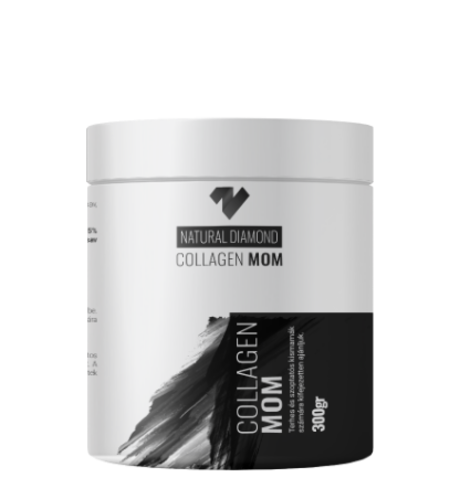
For mothers and nursing mothers
Hydrolysed Collagen, Calcium citrate, Magnesium citrate, vitamin C, algae.
1 serving contains 7000mg of collagen, 1000mg calcium citrate, 1000mg vitamin C, 1000mg magnesium citrate.1000mg Spirulina algae.
Hydrolyzed Collagen
Intake of collagen is strongly recommended during pregnancy and after childbirth. How does collagen help you during pregnancy?
Research shows that hydrolysalt collagen promotes bone health and has a positive effect on skin and hair. This is especially important during baby showers, as hormone changes can cause dry skin and hair, as well as hair loss, which unfortunately persists long after childbirth.
Looking at collagen, it has been shown to help reduce joint pain during pregnancy!
In the first and last months of pregnancy, most mothers sleep a lot. Quality sleep is important, to which glycine greatly contributes. Collagen has the presence of this amino acid, which is why it is important and beneficial to supplement our diet with it.
As a mother, we always want to give our child the best of everything, and it is worth starting with proper nutrition and vitamin supplementation during pregnancy.
During pregnancy, for example, the intake of calcium is essential, which contributes to the development of the baby's nervous system and bone structure. The first 1,000 days from conception
are of particular importance in babies' lives, because with proper nutrition we can prevent later diseases such as obesity, diabetes or cardiovascular disease.
Calcium
During pregnancy, the need for calcium increases by one and a half times . Calcium is an important part of the maternity diet. Already in the first 3 months of pregnancy, calcium plays a significant role, since during the first trimester the baby's nervous system develops, and by the end of the critical weeks, the bones and teeth also develop. However, most calcium is needed in the second and third trimesters of pregnancy, to which the fetus passes through the mother's body (the daily calcium intake recommended by OÉTI during pregnancy is 1200 mg). If the mother's diet does not contain enough, the baby will take the necessary calcium from the mother's body, so the maternity teeth may become brittle and deteriorate faster. Of course, calcium supplementation is important even after birth: according to the latest research, hungarian parents are very conscious up to the age of six months (only 8% of the age group has low calcium levels), but four out of ten babies over the age of 1 years are get too less calcium.
Magnesium citrate
Perhaps the most important role of magnesium is to inhibit contraction of muscles such as uterine muscle – greatly simplifying hardening and cramps. During pregnancy, during the first and second trimesters, this effect plays a major role in the preservation of calm. As a result, hardening and contraction of the uterine muscle can unfortunately also cause miscarriage or premature birth, which can be avoided by using magnesium.
Magnesium is also involved in normal energy-producing metabolic processes, maintaining normal functioning of the nervous system and muscles, as well as maintaining normal bone and teeth. But it also plays a significant role in maintaining normal psychological functions and normal cell division.
Magnesium contributes to:
- to reduce fatigue and fatigue
- proper functioning of the nervous system
- normal muscle function
- maintenance of normal psychological function
Vitamin C
Perhaps the most important advantage of vitamin C is its ability to energize the body to an incredible degree. By strengthening the immune system, this vitamin can be used to treat and prevent a wide variety of diseases. It is important to stress that the role of vitamin C in improving overall health is second to none. With regular taking, we wake up more rested, less tired during the day and sleep more deeply.
Vitamin C enhances the production of collagen, which is important in scabing, as well as in maintaining the elasticity of connective tissues and blood vessels. Therefore, vitamin C contributes to accelerating the healing of internal and external wounds, strengthening bones, teeth, cartilage and inarms.
Spirulina seaweed
Spirulina algae are among the oldest living things on Earth. Algae make up one third of the world's total. Thanks to their exceptional adaptability, they can withstand even the most extreme conditions. Spirulina algae can even cope with radioactive radiation. It has been shown that ancient peoples consumed it thousands of years ago because of its healing and nutritious properties.
• helps to maintain our health, strengthen our immune system
• antioxidant: protects cells and slows down their aging
• anti-allergenic and antiviral properties
• helps build cells
Spirulina seaweed contains a large amount of plant protein (~60%) which the human body can use with excellent efficiency. It contains all the basic amino acids that are extremely important to us. In addition to proteins, it also contains carotenoids, primarily beta-Carotene, vitamins including significant amounts of B vitamins, minerals, large quantities of iron, chlorophyll, the green color agent that binds and transports oxygen in plant cells, Phenylethylamine (PEA), which also has a mood-enhancing effect on mental performance. Microalgae contain a number of antioxidants that are able to control the destructive effects of free radicals.
Research shows that 1 gram of Spirulina is approximately 10 000 pounds. 1 kg of vegetables.
Use recommendation:
Daily dose: 1 serving spoon (10g)
Product contains: 30 servings(30 days)
Can be mixed with 2-3 dl of water, tea, juice or yogurt, preferably in the morning hours before meals or in the evening before bedtime. It is recommended to eat it quickly, because it gels quickly!